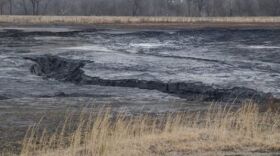A superior court judge this week ordered Duke Energy to dig up and remove coal at four North Carolina plants - something it's already doing under the state's 2014 coal ash cleanup law.
Judge Paul Ridgeway ordered excavations of coal ash basins at the Riverbend plant in Mount Holly as well as plants on the Dan River, Asheville, and Wilmington. State regulators had sued Duke in 2013 to seek cleanups at the four plants, and environmental groups later joined the suits.
The 2014 Coal Ash Management Act, passed after a major spill at the Dan River plant, also required coal ash to be removed at the four plants. A Duke spokesman says the company had sought the court orders, and said the company already has removed about 1.5 million tons of coal ash at the sites, he says.
"We're pleased the court recognizes that we've made progress identifying smart and safe ways to close ash basins, through ending this unnecessary litigation," Duke's Jeff Brook says.
A similar order in April required Duke to excavate ash at three other plants - on the Cape Fear River in Wilmington and Moncure, the Neuse River in Goldsboro, and the Lumber River in Lumberton.
Brooks said Friday Duke is hoping to win dismissal of two similar suits filed in federal court over the Riverbend and Sutton plants.
The Southern Environmental Law Center, which represented environmental groups in the suits, applauded the new and previous court orders.
“North Carolina’s Superior Court has now ordered the excavation and removal of coal ash at seven of fourteen leaking Duke Energy coal ash storage sites across North Carolina. This latest order ensures the protection of four communities and rivers across the state, even if politicians in Raleigh ever decide to change the Coal Ash Management Act’s requirement that the coal ash at these four sites be excavated," Frank Holleman, a senior attorney with the group, said in a statement.
The state legislature this week passed a bill updating Coal Ash Management Act, which sets a process and deadlines for cleanups.
Among other things, the bill would require Duke to provide a safe water supply to plant neighbors concerned about their wells. It also would revive the Coal Ash Management Commission, to oversee cleanups. And it would give Duke more time to come up with coal ash basin closure plans.
Gov. Pat McCrory has threatened a veto, saying he doesn't think the coal ash commission is needed.
With this week's court decisions, Duke now is under order to excavate coal ash at seven of its 14 N.C. plants, and move it to new, lined landfills.
That leaves exact plans for the other seven up in the air. They are Cliffside in Rutherford County, Allen on Lake Wylie, Marshall on Lake Norman, Buck near Salisbury, Belews Creek, Roxboro and Mayo.
Last month, the state Department of Environmental Quality issued risk ratings for all of Duke's coal ash sites, and ordered ash at all to be removed.
Duke supports the legislature's proposed revisions to the Coal Ash law, which would set aside those ratings. That could give Duke the option of keeping coal ash in place at some or all of the remaining plants.
"We think the bill further strengthens the Coal Ash Management Act and ensures our state has the flexibility to make the best decisions about how to close coal ash basins," Brooks said.
"We're going to let science determine what the best closure option is," he said. The company argues that requiring removal at all plants would be too costly for Duke and ratepayers.
Plant neighbors and environmentalists have been pushing for removal at all of Duke's sites.
Copyright 2016 WFAE






